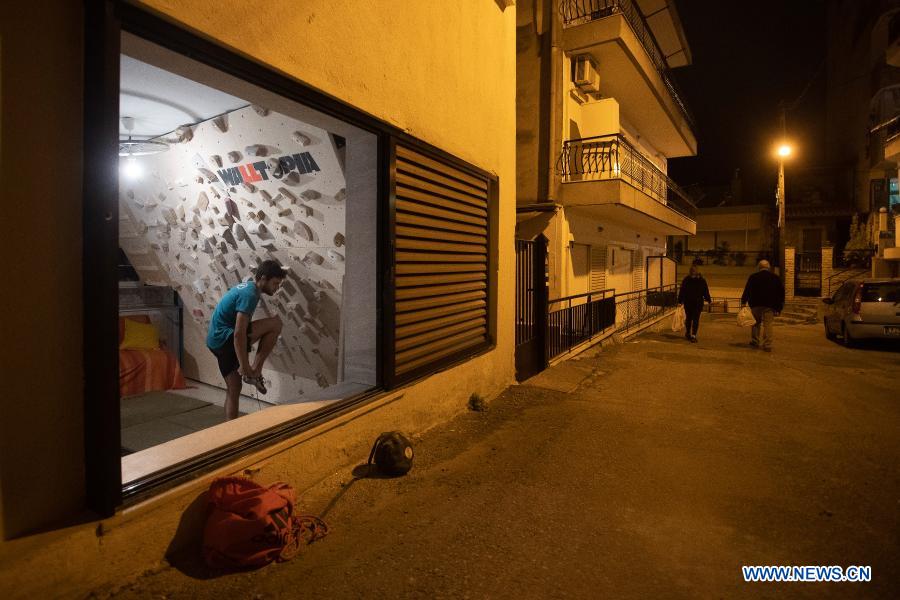
Greek climbing athlete and medical student Manthos Valsamidis is seen after training at a climbing wall in the living room of his house in Thessaloniki, Greece, on Nov. 10, 2020. What happens when an athlete addicted to climbing rocks is forced by the COVID-19 lockdown to remain indoors? The answer came easy to 21-year-old Greek climbing athlete and medical student Manthos Valsamidis: he built a climbing wall in his living room to stay in shape. Greece entered a second full nationwide lockdown on Nov. 7, which is scheduled to last until Nov. 30 as part of efforts to curb the spread of coronavirus. (Photo by Dimitris Tosidis/Xinhua)
by Maria Spiliopoulou
THESSALONIKI, Nov. 16 (Xinhua) -- What happens when an athlete addicted to climbing rocks is forced by the COVID-19 lockdown to remain indoors? The answer came easy to 21-year-old Greek climbing athlete and medical student Manthos Valsamidis: he built a climbing wall in his living room to stay in shape.
"By having the climbing wall in my home, I am more organized and I can follow a full training routine," he told Xinhua on Saturday evening while warming up.
Valsamidis took up the sport 10 years ago. He loves the feeling of being several meters above the ground, close to the rocks, near nature, he explained.
Climbing is his passion and he intends to keep it that way as long as he can, he said.
During the first lockdown in Greece last spring, which lasted over a month, he missed the opportunity to keep himself in rock climbing shape.
This time he was well prepared when Greece entered a second full nationwide lockdown on Nov. 7, which is scheduled to last until Nov. 30 as part of efforts to curb the spread of coronavirus.
Thessaloniki, the port city where he lives, has been hit the hardest by coronavirus in the region in recent weeks, according to official figures. It now has the highest daily tally in the country.
On Sunday, the Hellenic National Public Health Organization (EODY) announced 1,698 new infections and a record 71 deaths within 24 hours, which brought the total number of confirmed cases to 74,205 since the first case was diagnosed in the country on Feb. 26. The total number of COVID-19 fatalities has now reached 1,106, and 392 patients are intubated across Greece.
Like many of his compatriots, Valsamidis is doing his very best to shift beyond doom and gloom: he meticulously follows the personal protection measures and looks to the future with optimism.
"I see this lockdown period as an opportunity given to me to progress more with my training, but also with my studies. I have more time to study and train since I am not losing time commuting," he told Xinhua.
Once the COVID-19 pandemic is over, he would like to visit China.
"I would like to visit the Great Wall. I have also seen photos of enchanting caves in China, and have heard about a climbing trip organized by prominent climbers to beautiful and unique rock formations along a picturesque river. The images I saw were magnificent. It is a landscape one can hardly find anywhere else. I would like to test my climbing skills there," he said.
Most of Valsamidis' neighbors are trying to stay fit by walking, jogging or cycling outdoors.
Meanwhile, pensioner George Tanidis is happy to be able to meet his friends for a few hours each morning while sitting on a seafront bench in Thessaloniki and soaking up the sun. The restrictions prevent him from enjoying his morning coffee at the cafe with his friend Panagiotis, but they still meet outdoors while keeping the two-meter safety distance.
At noon, he goes back home for lunch and spends the rest of the day watching sports on television, he told Xinhua on Sunday.
Tanidis is sad to see his beloved city paralyzed by the virus. At the start of the pandemic in Greece last spring Thessaloniki's numbers were better.
"We should not have lost control," he said, referring to the situation in the spring, when Thessaloniki was faring better. "We were doing very well, but unfortunately the situation has spiraled out of control since then. Thessaloniki is a university town that hosts many students, they account for up to 10 percent of our population of 1.1 million," he said.
State officials insist that the reopening to tourism in the summer was not the cause of the current spike in infections, and they do not blame the partying students either. Still, Tanidis believes that the tourists from the neighboring Balkan countries who visited northern Greece this past summer contributed to the rapid spread of the virus, and adds that the second wave of the pandemic is arguably more challenging for his country than the first.
Nevertheless, Tanidis is optimistic. "We hope that we will somehow overcome this," he said.